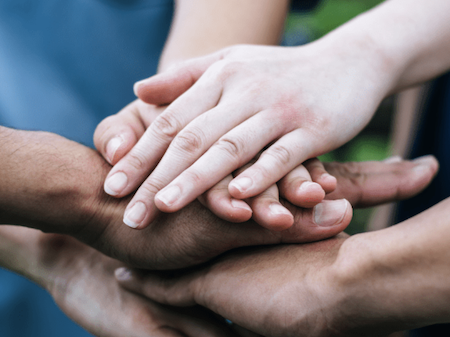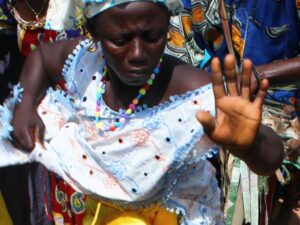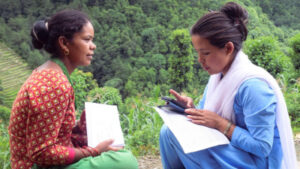Colombia Cuida a Colombia is an organization creating collaborative spaces, mentorship, and exchange of best practices around systematic change in Colombia.
María Rubio of Colombia Cuida a Colombia spoke with Jessica Kantor on April 14, 2023. Click here to read the full conversation with insights highlighted.
Jessica Kantor: Can you please introduce yourself, your organization, your role in the organization and the problem that you are addressing?
María Rubio: I am María Rubio. I am the co-founder of Colombia Cuida a Colombia or Colombia Cares for Colombia. We have rotational leadership. We are a movement that started in the pandemic, in 2020, and we are very good at articulating solutions for the emergency. We’ve transcended to connect and articulate to systemic change and we’ve become a safe space for all types of stakeholders, left and right.
People tell us all the time how Colombia Cuida a Colombia gave them hope when they thought the world was ending. We have a safe space for everyone and we are working on building solutions together, more on the how than on the what.
We do it in three ways. First, we gather people around co-building solutions. What is system change? What is collaboration? Second, we promote initiatives that are collaborative and that work on systems change. And third, we communicate and visualize collaboration and systemic change. For example, in the third line, we have concerts with artists and influencers to promote care in different regions of Columbia. We also promote initiatives where businessmen, like the owners of businesses, get together with community leaders and they co-build solutions together for their cities.
Jessica Kantor: It sounds like you started out being a virtual organization, have you now moved to in-person?
María Rubio: At the beginning, yes. That was 2020 and it was all virtual. We had a lot of initiatives and committees working online all the time. Right now we have a staff, we have a communications team and partnerships, and we are working on many initiatives locally.
Jessica Kantor: What makes your approach distinctive from other organizations that might be doing similar things?
María Rubio: We are a movement that believes that leadership should be rotational. The real difference is in working on the how and not on the what. And this implies that we are always revising what type of structure is better to influence collaboration and influence systems change, adapting to the needs of the different ecosystems.
For example, right now we are very worried about democracy in Colombia. I just spoke to a Skoll awardee about that. He is working on democracy, his organization is Protect Democracy. I’ve been working on what partners we should get together to work on democracy and Colombia Cuida a Colombia doesn’t necessarily lead, but we put the puzzle together and we follow up to make sure that we are on the right path. We start the initiative and then unite other organizations that share common good purposes.
Jessica Kantor: How are you measuring success?
María Rubio: We measure it mainly based on how many connections and initiatives we get started and how these initiatives go. Making clear that the results of the initiatives are not ours. What we really do is connect and articulate, but it’s more about giving the credit to the protagonists of the initiatives.
Jessica Kantor: What evidence do you have that you’re making progress?
María Rubio: In 2020, we reached more than 3 million families and we were able to raise about $4 million with our initiative. After that, we’ve kept growing from 400 partners to the 1000 partners we have today. We’ve had a change in government from Right to Left and the new Left government has been contacting us so we can connect them to other types of stakeholders. For us, this is a very good indicator that we are really a safe space.
Jessica Kantor: Do you have any specific examples that you can share that illustrate the impact of your work?
María Rubio: Of course, yes. We had a concert on May 1st, 2020, which connected the whole country because we had all the TV channels, all the radio broadcasts, talking about Colombia Cuida a Colombia. This was great momentum for our organization. Right now, we are working on becoming good at being able to co-build different points of view in society, like different profiles. For example, we are working on how to get businessmen and community leaders together to co-build solutions. They all feel safe getting together with the invitation of Colombia Cuida a Colombia. We also had a very good one with the new government. We have a lot of emergencies with floods and the government knocked on our door and asked for help so we could get retail stores to donate food for the emergency. We work on food solutions all the time with the Association of Businesses and Companies in Columbia, and they were fighting with the government. They were both always in the media fighting each other. So when the government approached us, we said, okay, we will work on the solutions with the Association of Companies, but we have to sign the agreement together with them. The government didn’t want to, but it required high diplomacy and we finally signed the agreement a month later. So we were able to get the private companies and the government together for a solution.
Jessica Kantor: What are some lessons that you learned either early on or recently that taught you what you shouldn’t be doing? I ask so that others can potentially learn that lesson from your experience.
María Rubio: Our essence is to be a movement and to be that safe space and we made a mistake two and a half years after we were founded. We started operating some programs and we’re not supposed to do that because what we have to do is put together the puzzle for others to do the work. In Spanish, we say, pass a goal, which is where you pass the ball so the other one makes the goal. That’s our place in the game. When we hired a team, the team thought their place in the game was to make the goal, but that’s not our place. We have to always remember that our space in the game is to be in the back making sure that everyone is all right, taking care of the players and making sure we’re all focused on the principles and values around common good.
Jessica Kantor: That’s a great analogy. Are you facing any kind of challenges or limitations currently that you haven’t been able to figure out?
María Rubio: We’ve been struggling with what is the correct structure for the movement. Everything that I’m telling you about our history, that we started as an organic and spontaneous movement with the process. We tried to build a structure and the structure turned out to be too inflexible. So now we’re returning to our beginnings and returning to being a movement. But we do have to add some processes and some type of flexible structure. Right now we’ve been analyzing the rules of the game because we have to identify the correct rules that will actually be good to promote a dynamic of scale, a dynamic of action, not so restrictive that it blocks action and scale, but not so open and inflexible that it allows misunderstandings between partners. Right now we are doing those analyses, writing a lot of papers about it to have sounding boards among our partners. That’s the phase we are in. I’m sure we’ll figure it out in 2023, but we need all the help we can get.
Jessica Kantor: What do you think is needed from other actors and other partners outside of your organization in order to help do the work?
María Rubio: The key behind Colombia Cuida a Colombia has been to join purposes. For example, today I had lunch with a very important partner in Colombia and he said, how can I help? And I said, participate more. I started asking him what his needs are, his current purposes, and from there we can connect the purposes of our movements and of other partners. It’s basically more engagement, and that engagement requires a space where logos and egos are taken to the side and we move forward together.
Jessica Kantor: How do you see your work evolving over the next five years?
María Rubio: We have a very clear agenda towards common good and how, as a society, as a country, as a nation, we should agree upon what’s needed in education, in business. We should agree on those basic values and how to move forward and build solutions together. Our country, like many in the world, is very polarized and unfortunately the government is very polarizing.
Our work over the next five years is to be able to communicate the importance of co-building and of being empathic, seeing each other’s point of view, and how we can find the common space where we all win. Going from a logic that is win-lose to a win-win logic. A lose-win logic, where someone has to lose for others to win, that’s not the way to build it. Our agenda is definitely around how to be more conscious about the importance of win-win situations and how we can mature and look inside. Everyone can have an inside look and transcend negative feelings to positive and constructive feelings.
Jessica Kantor: If you were to summarize your mission in one to two sentences, what would that be?
María Rubio: We connect and articulate for systems change. That’s it.
Jessica Kantor: Thank you so much for sharing your insight with me.
Click here to read the full conversation with insights highlighted.
Jessica Kantor is an independent journalist specializing in health, human rights, and social impact. Her work can be found in Fast Company, Healthcare Quarterly, The Las Vegas Review-Journal, and others. She is a living kidney donor.
* This interview has been edited and condensed.
Find other social change organizations working in Columbia.







